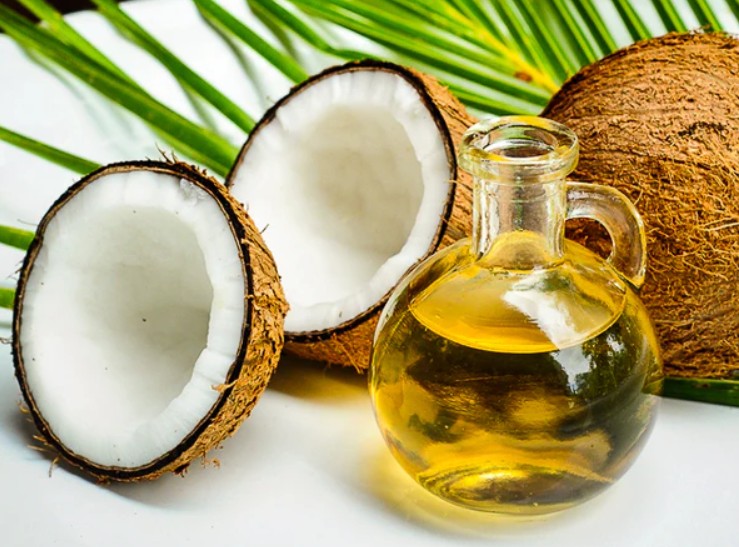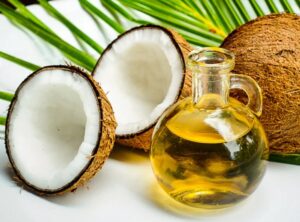10 Amazing Health Benefits of Cooking with Coconut Oil

Introduction
Coconut oil has become one of the most talked-about ingredients in kitchens around the world, and for good reason. Once considered just a tropical cooking fat, it has now gained recognition as a superfood thanks to its wide range of health-boosting properties. From its rich aroma to its versatility in cooking, coconut oil is much more than just a flavorful addition to your meals—it’s also packed with nutrients that can positively impact your overall well-being.
What makes coconut oil stand out from other oils is its unique composition. Unlike vegetable oils that are high in long-chain fatty acids, coconut oil is primarily made up of medium-chain triglycerides (MCTs), which the body processes differently. These MCTs are quickly absorbed, converted into energy, and even linked to various metabolic and cognitive benefits. On top of that, coconut oil contains lauric acid, a compound known for its antimicrobial properties, and a host of antioxidants that support long-term health.
In this article, we’ll explore the 10 amazing health benefits of cooking with coconut oil, from boosting metabolism and improving heart health to supporting brain function and even enhancing beauty from within. Whether you’re health-conscious, following a specific diet like keto, or simply curious about adding new flavors and nutrition to your meals, you’ll discover why coconut oil deserves a permanent spot in your pantry.
What Makes Coconut Oil Unique?
Coconut oil isn’t just another cooking fat you pick up at the grocery store—it’s a powerhouse with a composition that sets it apart from the rest. While many oils are made up of long-chain fatty acids, coconut oil is predominantly composed of medium-chain triglycerides (MCTs). This difference in structure changes how your body digests and uses the fat.
The Power of Medium-Chain Triglycerides (MCTs)
MCTs are digested more efficiently than long-chain fatty acids. Instead of being stored in fat cells, they go directly to the liver, where they are quickly converted into energy. This makes coconut oil a favorite among athletes, fitness enthusiasts, and people following the keto diet, as it provides a fast, clean fuel source for both the body and the brain.
Virgin vs. Refined Coconut Oil
Not all coconut oils are the same, and understanding the differences helps you choose the best one for your needs:
- Virgin Coconut Oil (VCO): Extracted from fresh coconut meat without chemical processing. It retains more nutrients, antioxidants, and that natural coconut aroma and flavor.
- Refined Coconut Oil: Made from dried coconut (copra) and often goes through bleaching and deodorizing. It has a neutral taste and a higher smoke point, making it great for high-heat cooking but slightly lower in antioxidants.
- Extra Virgin Coconut Oil: Though often used interchangeably with virgin coconut oil, the term “extra virgin” isn’t officially regulated in the coconut industry. Most often, it’s simply a marketing label for high-quality virgin oil.
A Heat-Stable and Versatile Oil
Another feature that makes coconut oil unique is its high smoke point, especially when refined. Unlike oils such as flaxseed or some vegetable oils that break down at high temperatures, coconut oil stays stable, making it ideal for frying, roasting, and sautéing. Its natural resistance to oxidation also means it has a longer shelf life compared to many other oils.
In short, coconut oil’s unique fatty acid profile, versatility in cooking, and variety of processing options make it a one-of-a-kind ingredient. Understanding these qualities is the first step to appreciating the powerful health benefits it can bring to your meals and lifestyle.
Top 10 Health Benefits of Cooking with Coconut Oil
Coconut oil is more than just a cooking fat—it’s a nutritional powerhouse with benefits that go far beyond the kitchen. From fueling your body with quick energy to supporting long-term wellness, coconut oil can make a meaningful difference in your diet and lifestyle. Let’s break down the 10 amazing health benefits of coconut oil for cooking that you should know.
- Boosts Metabolism and Energy Levels
Coconut oil is rich in medium-chain triglycerides (MCTs), which are metabolized differently from other fats. Instead of being stored, they are rapidly converted into energy by the liver. This quick energy boost can enhance daily performance, making coconut oil an excellent choice for athletes, busy professionals, or anyone needing sustained stamina throughout the day.
- Supports Weight Management
The MCTs in coconut oil are also linked to increased satiety, meaning you feel fuller for longer after meals. This can naturally reduce calorie intake and support weight management. Some studies suggest that replacing other fats with coconut oil may help reduce belly fat over time.
- Promotes Heart Health
Although coconut oil contains saturated fat, not all saturated fats are harmful. Lauric acid in coconut oil has been shown to raise good HDL cholesterol levels, which play a protective role in cardiovascular health. Balanced consumption may support a healthier cholesterol ratio and improved heart function.
- Enhances Brain Function
The brain thrives on energy, and MCTs provide a fast and efficient fuel source. Research indicates that MCTs may benefit brain function, particularly in older adults or individuals with mild memory challenges. Coconut oil’s quick-converting fats make it a natural brain booster.
- Strengthens the Immune System
Coconut oil is naturally antimicrobial thanks to compounds like lauric acid, capric acid, and caprylic acid. These substances can help fight off harmful bacteria, viruses, and fungi. Incorporating it into your diet may strengthen your immune defense and reduce the risk of common infections.
- Improves Digestion and Gut Health
Cooking with coconut oil can support smoother digestion. Its healthy fats aid in the absorption of fat-soluble vitamins (A, D, E, and K) and essential minerals. Meanwhile, its antimicrobial qualities may help balance gut bacteria, promoting a healthier digestive environment.
- Provides Antioxidant Protection
Coconut oil contains powerful antioxidants, including polyphenols, that help fight oxidative stress and inflammation. By neutralizing harmful free radicals, antioxidants reduce the risk of chronic diseases and support overall wellness.
- Stabilizes Blood Sugar Levels
Healthy fats like coconut oil can help regulate blood sugar by slowing digestion and improving insulin sensitivity. This makes it particularly beneficial for people looking to maintain steady energy levels or those managing conditions such as type 2 diabetes.
- Enhances Skin and Hair from Within
What you eat affects how you look. Regularly including coconut oil in your diet can provide essential nutrients that promote healthy skin and shiny hair. Its fats and antioxidants nourish the body from the inside out, giving you a natural glow and stronger strands.
- Versatile and Heat-Stable for Cooking
Finally, coconut oil is highly versatile in the kitchen. Thanks to its high smoke point, it remains stable even at high cooking temperatures. Whether you’re frying, sautéing, roasting, or baking, coconut oil maintains its beneficial properties while adding a subtle, delicious flavor to your dishes.
Cooking with coconut oil isn’t just about taste—it’s about tapping into a wide array of health benefits that can transform the way you eat, feel, and live. By replacing other oils with coconut oil in your recipes, you can enjoy both culinary delight and lasting wellness.
How to Use Coconut Oil in Everyday Cooking
One of the best things about coconut oil is its versatility in the kitchen. Whether you’re frying, baking, or simply spreading it on toast, coconut oil adds a subtle tropical flavor while delivering numerous health benefits. The key is knowing how and when to use it so you can enjoy both its taste and nutritional value.
Use It as a Butter Substitute
Coconut oil can easily replace butter or margarine in your recipes. Whether you’re spreading it on warm toast, melting it over steamed vegetables, or using it in pancake batter, it offers a dairy-free alternative that’s just as satisfying. For vegans or people with lactose intolerance, it’s a fantastic swap.
Perfect for Frying and Sautéing
Thanks to its high smoke point, coconut oil is excellent for frying and sautéing. It remains stable at higher temperatures, which means it won’t break down into harmful compounds as some vegetable oils do. Try using it to stir-fry vegetables, sear meats, or make crispy fried eggs.
Baking with Coconut Oil
Coconut oil is also great for baking. You can replace traditional fats like butter or vegetable oil with coconut oil in cakes, cookies, and muffins. It not only makes baked goods moist but also adds a delicate hint of coconut flavor that pairs beautifully with chocolate, banana, or tropical fruits.
Add It to Smoothies and Coffee
For an extra energy boost, blend a spoonful of coconut oil into your morning smoothie or coffee. Many people following the keto diet enjoy “bulletproof coffee” made with coconut oil or MCT oil for sustained energy and mental clarity throughout the day.
Use in Salad Dressings and Sauces
While coconut oil solidifies at cooler temperatures, it can still be used in dressings and sauces when melted. Combine it with lemon juice, vinegar, and herbs for a unique twist on your usual salad dressing.
Drizzle on Popcorn or Vegetables
Instead of butter, melt coconut oil and drizzle it over freshly popped popcorn or roasted vegetables. It creates a delicious, guilt-free snack that’s both healthy and satisfying.
Tips for Using Coconut Oil in Cooking
- Measure properly: Replace butter or oil with coconut oil at a 1:1 ratio.
- Mind the flavor: Virgin coconut oil has a stronger coconut taste, while refined coconut oil has a neutral flavor for savory dishes.
- Store correctly: Keep your coconut oil in a cool, dry place. It naturally solidifies below 76°F (24°C) but melts easily when heated.
Incorporating coconut oil into your cooking routine is simple and rewarding. Whether you use it in small ways, like adding it to your morning coffee, or in bigger ways, like replacing your everyday cooking oils, coconut oil offers both delicious flavor and health benefits with every spoonful.
Choosing the Right Coconut Oil
With so many options on the shelves, picking the right coconut oil can feel overwhelming. Should you go for virgin, extra virgin, refined, or cold-pressed? Each type of coconut oil has unique qualities, and the best choice depends on your cooking style, health goals, and personal preference. Here’s a guide to help you make the right decision.
Virgin Coconut Oil (VCO)
Virgin coconut oil is made from fresh coconut meat without undergoing chemical refining or bleaching. It retains more of its natural nutrients, antioxidants, and distinctive coconut flavor. This makes it ideal for people who value purity and want the maximum health benefits. It’s especially popular in smoothies, baking, or sautéing dishes where the tropical flavor enhances the recipe.
Extra Virgin Coconut Oil
Unlike olive oil, where the term “extra virgin” is officially regulated, in the coconut oil industry, there’s no strict standard. Most brands label high-quality virgin oil as “extra virgin.” Essentially, it’s the same as virgin coconut oil—freshly extracted, nutrient-rich, and aromatic. If you see “extra virgin” on the label, treat it as a premium virgin coconut oil.
Refined Coconut Oil
Refined coconut oil is produced from dried coconut (copra) and undergoes processes like bleaching and deodorizing. While it has fewer antioxidants than virgin coconut oil, it comes with a neutral flavor and a higher smoke point. This makes it better suited for frying, roasting, or cooking savory dishes where you don’t want the coconut taste to dominate.
Cold-Pressed Coconut Oil
Cold-pressed coconut oil is extracted mechanically at lower temperatures, which helps preserve its natural nutrients and antioxidants. Often, this oil is also virgin. If you’re looking for the purest form of coconut oil with maximum nutritional value, cold-pressed is the way to go.
What to Look for on Labels
When buying coconut oil, always check for:
- 100% pure and unrefined for maximum health benefits.
- Organic certification, which ensures no harmful chemicals were used during processing.
- Non-hydrogenated and free from trans fats.
- Packaging in glass jars or BPA-free containers to maintain freshness.
Which One Should You Choose?
- Choose virgin or extra virgin if you want maximum health benefits and enjoy the natural coconut aroma.
- Opt for refined coconut oil if you need a neutral taste for everyday frying and high-heat cooking.
- Go for cold-pressed if you want a nutrient-rich oil for health-conscious recipes.
By understanding the differences and knowing what to look for, you can confidently choose the coconut oil that best fits your cooking style and lifestyle needs.
Precautions and Things to Consider
While coconut oil offers an impressive range of health benefits, it’s important to remember that no single food is a magic bullet. Like all fats, coconut oil should be consumed in moderation and used as part of a balanced diet. Here are some key precautions and considerations to keep in mind before making it a staple in your kitchen.
Watch Your Intake
Coconut oil is calorie-dense, with about 120 calories per tablespoon. Eating too much can quickly add excess calories to your diet, potentially leading to unwanted weight gain. Most health experts recommend limiting consumption to 1–2 tablespoons per day, especially if you’re already consuming other sources of fat.
Saturated Fat Content
Although the saturated fat in coconut oil is different from that in animal products, it’s still high—making up about 90% of its total fat content. Some studies suggest that excessive saturated fat intake may contribute to cardiovascular issues in certain individuals. If you have a history of heart disease or high cholesterol, consult with your healthcare provider before significantly increasing your intake.
Not a Cure-All
Coconut oil has been widely promoted as a “superfood,” but it’s not a cure-all. While it can support heart, brain, and digestive health, it should not replace a varied diet rich in fruits, vegetables, whole grains, lean proteins, and other healthy fats such as olive oil or avocado. Think of it as a valuable addition, not a sole solution.
Choose Quality Over Quantity
Not all coconut oils are created equal. Poorly processed oils may contain chemicals or lack the nutrients found in virgin or cold-pressed varieties. Always choose organic, unrefined, non-hydrogenated coconut oil for the best health benefits and fewer potential risks.
Individual Health Considerations
- Digestive issues: Some people may experience mild stomach discomfort or loose stools when first introducing coconut oil. Start with small amounts and increase gradually.
- Allergies: Though rare, coconut allergies do exist. If you experience itching, swelling, or difficulty breathing after consuming coconut products, seek medical attention immediately.
- Medical conditions: Those with metabolic disorders, heart conditions, or who are on specific medications should speak to their doctor before making coconut oil a daily habit.
Balance is Key
The best approach to coconut oil is balance. Combine it with other healthy fats—such as olive oil, flaxseed oil, or avocado—to ensure you’re getting a variety of nutrients. By using it wisely, you can enjoy its benefits without overloading your diet.
Conclusion
Coconut oil has rightfully earned its place as one of the most versatile and health-supporting ingredients in modern kitchens. From boosting metabolism and improving brain function to supporting heart health and even enhancing your skin and hair, its benefits extend far beyond simple cooking. What makes it truly special is its unique composition of medium-chain triglycerides (MCTs) and lauric acid, giving it properties that few other oils can match.
That said, the key to getting the most out of coconut oil is balance and mindful use. Incorporating 1–2 tablespoons a day into your meals—whether in frying, baking, or even your morning coffee—can be a simple yet powerful step toward better health. But remember, no single food can do it all. Pair coconut oil with a diverse, nutrient-rich diet to reap the greatest rewards.
So, whether you’re a health enthusiast, a foodie looking for new flavors, or someone on a journey toward better nutrition, coconut oil deserves a spot in your pantry. Start experimenting with it in your favorite recipes, and you’ll soon discover that cooking with coconut oil doesn’t just make your meals more delicious—it makes your lifestyle healthier too.
Frequently Asked Questions About Cooking with Coconut Oil
- Is coconut oil safe for frying?
Yes, coconut oil is safe for frying because of its high smoke point (around 350°F/175°C for virgin and up to 400°F/204°C for refined). This means it stays stable at higher temperatures, unlike some vegetable oils that break down and release harmful compounds. Refined coconut oil is the best choice for deep frying or high-heat cooking since it has a more neutral flavor.
- How much coconut oil should I eat daily?
Most health experts recommend consuming 1–2 tablespoons per day as part of a balanced diet. While coconut oil has many health benefits, it is still calorie-dense, so moderation is key. Pairing it with other healthy fats like olive oil or avocado ensures a well-rounded intake of essential fatty acids.
- What’s the difference between virgin and refined coconut oil?
- Virgin Coconut Oil (VCO): Extracted from fresh coconut meat without chemical processing. It retains a natural coconut aroma, flavor, and more antioxidants.
- Refined Coconut Oil: Made from dried coconut (copra), deodorized, and bleached. It has a neutral taste and higher smoke point, making it ideal for frying and savory dishes.
Both can be healthy, but your choice depends on whether you prefer flavor and nutrients (virgin) or cooking versatility (refined).
- Can I use coconut oil for baking?
Absolutely! Coconut oil works wonderfully in baking. You can replace butter or vegetable oil at a 1:1 ratio in cakes, cookies, or muffins. It gives baked goods a moist texture and a mild coconut flavor that pairs well with chocolate, banana, and tropical fruits. If you prefer a neutral flavor, opt for refined coconut oil.
- Does coconut oil help with weight loss?
Coconut oil isn’t a miracle fat burner, but it may support weight management when used wisely. The medium-chain triglycerides (MCTs) in coconut oil are digested quickly, providing energy and promoting satiety, which can help reduce overeating. Combined with a healthy diet and exercise, coconut oil can play a supportive role in maintaining a healthy weight.
- Is coconut oil good for people with diabetes?
Coconut oil may help regulate blood sugar by improving insulin sensitivity and slowing digestion, which prevents sudden spikes in glucose levels. However, people with diabetes should consult their healthcare provider before adding it regularly, as overall diet and lifestyle play a larger role in blood sugar control.
- How should I store coconut oil?
Coconut oil should be stored in a cool, dry place away from direct sunlight. It naturally solidifies below 76°F (24°C) and liquefies when warmer, but this does not affect its quality. Make sure to keep it in a sealed glass jar or BPA-free container to maintain freshness and prevent contamination.







